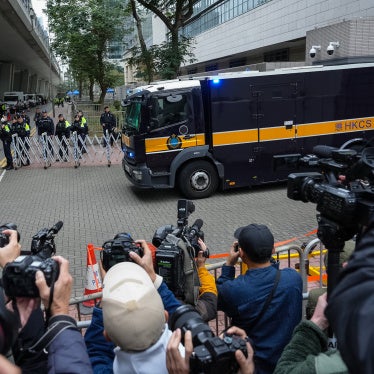(New York) - As Tung Chee-hwa arrives in Washington for his first visit to the United States as chief executive of China's "Special Administrative Region" of Hong Kong, Human Rights Watch/Asia called on President Clinton, Members of the U.S. Congress, and business people to raise concerns with him about the erosion of legal safeguards to protect human rights.
The SAR has been in existence for just over two months; it is far too early to judge the effects of the transition to Chinese rule on its autonomy. To all appearances, Hong Kong is no different than it was before July 1, 1997, and no dissidents have been arrested, demonstrations banned, or human rights organizations dissolved. The changes to the political and legal system that Tung has endorsed, however, weaken existing checks on executive authority, violate the internationally-recognized right to participate in government through freely elected representatives, undermine existing human rights protections, and lay the legal foundation for serious human rights violations in the future.
Weakening popular participation in government
As is by now well known, the 1992 reforms initiated by then-Governor Chris Patten that led to an increase in the number of popularly elected seats in the Legislative Council (Legco) in Hong Kong were rejected by China. In elections held in September 1995, pro-democracy parties won sixteen out of the twenty directly elected seats. In March 1996, the Preparatory Committee, a body hand-picked by China to handle transition matters, voted to disband the elected Legco and in December 1996, the committee empowered a selection committee to appoint a provisional legislature that would remain in place for one year. (Mr. Tung has now said that elections will take place in May 1998.) The provisional legislature began meeting immediately in China.
Not only has the provisional legislature already passed laws which have far-reaching implications for civil liberties in Hong Kong, but it will also vote to replace itself with a system that will drastically reduce the number of directly elected seats. Under the terms of new voting laws presented to the public on August 15, two-thirds of the legislature's sixty seats are to be filled by "functional constituencies" with a heavy business and corporate focus. The remainder are to be elected not through the "one person, one vote" system that allowed pro-democracy candidates to sweep the polls in the 1995 elections, but in one of two possible systems, variations on proportional representation, that would reduce the number of seats held by the most popular pro-democracy groups.
Following China's Lead On "National Security"
Many authoritarian governments, and China is one, use "national security" grounds as a pretext for preventing political dissent. It was therefore particularly disturbing when last February, China's National People's Congress decided to amend two British colonial laws, the Societies Ordinance and the Public Order Ordinance, that had in 1992 and 1995 respectively had been brought into conformity with Hong Kong's Bill of Rights. The proposed amendments would have made it possible for the SAR to ban demonstrations or dissolve associations on broadly-defined political grounds in the interests of "national security." After a much-publicized "consultation" process through which Mr. Tung invited public comment on the laws, some of the most egregious provisions in the draft were dropped. But even in their final form as passed by the provisional legislature on June 14, the laws have disturbing elements.
Whereas before groups organizing protests had to merely notify the police of their plans, they now must receive permission from the police, which may be denied in the interests of national security. On July 18, the Commissioner of Police issued a document entitled "Guidelines on 'National Security' in the Public Order Ordinance" in which he cited "advocacy of independence for Taiwan or Tibet" as grounds for refusing permission to demonstrate. Although protests critical of China have taken place in Hong Kong since the transition, organizers have sometimes experienced difficulties in having venues approved and protesters have become self-consciously more muted in the message they bring to the streets.
Likewise, in the final version of the Societies Ordinance, the government is empowered to deny registration to a society whereas before, societies simply had to notify the government of their formation to have a legal and lawful existence. "National security" is again grounds for denying registration, and societies deemed to be "political organizations" are barred from receiving funds from abroad. Mr. Tung's consultation process did result in narrowing some of the definitions used. "Political organization," for example, was defined to meet only those organization which put up candidates for election to public office.
The focus on national security is particularly worrisome given the way that concept has been used in China to curb political dissent.
Weakening Rights Protection
China's National People's Congress (NPC), the provisional legislature, and Mr. Tung himself have taken several steps that undermine human rights protections in Hong Kong.
1. In February 1996, the NPC resolved to repeal key provisions of Hong Kong's Bill of Rights that effectively required Hong Kong's domestic laws to conform to the International Covenant on Civil and Political Rights. The repeal went into effect on July 1, 1997.
2. Although the Basic Law, the SAR's constitution, provided for the continued application of the ICCPR to Hong Kong after July 1 despite the fact that China is not a party, the Chinese government announced it would not submit reports on Hong Kong to the Human Rights Committee, the body set up under the ICCPR to monitor compliance with its provisions.
3. On July 16, the provisional legislature suspended four labor laws passed by the elected legislature in the days leading up to the handover. The laws would have brought Hong Kong into compliance with standards set by the International Labour Organisation. They explicitly guaranteed the right to union representation and collective bargaining, the right to conduct union activity on an employer's premises, and the right to be compensated for union work done during the course of the normal work day. The laws also altered previous legislation that had restricted union sovereignty and would have allowed unions to act without governmental approval on certain internal issues.
4. On August 29, Tung endorsed Malaysian Prime Minister Mahathir's suggestion that the Universal Declaration of Human Rights should be reviewed. He cited the enormous change that developing nations have undergone and said, "Human rights is not a monopoly of the West." Mahathir's statement, made at the annual meeting of the Association of Southeast Asian Nations in Kuala Lumpur in July, was an ominous move on the eve of the 50th anniversary of the most important international human rights standard in existence.
Laws On Subversion, Secession and Official Secrets
Article 23 of the Basic Law, completed after the 1989 Tiananmen crackdown brought millions of Hong Kong residents to the streets in protest, requires the SAR to enact laws against treason, sedition, secession, subversion and theft of state secrets. Hong Kong already had laws on treason and sedition, which were amended and liberalized by the last elected legislature. No laws existed, however, for the crimes of secession and subversion. Tung Chee-hwa has said that such laws will only be enacted after legislative elections take place in 1998, but there is still a question of why such laws are needed at all. In authoritarian legal regimes, the offense of "subversion" is often applied to acts of peaceful dissent against the ruling party. Likewise the crime of "secession" is often misapplied to peaceful advocacy of independence for a territory. A secession law might well be used against campaigners for the independence of Taiwan or Tibet, for example, despite the fact that such advocacy would be entirely protected by the right of free expression set forth in the International Covenant on Civil and Political Rights.
In the final days of the elected legislature, the British administration pushed a heavily-opposed Official Secrets Ordinance through the Legislative Council on June 4, 1997, a day when most members of the pro-democracy parties were absent commemorating the anniversary of the Tiananmen crackdown. The act, modeled on much-criticized British legislation, criminalizes a broad sweep of activity, such as merely being "in the neighborhood of...a prohibited place" for "a purpose prejudicial to the safety or interests" of Hong Kong, or obtaining or communicating any information at all that "might be...useful to an enemy." Terms like "interests" are undefined, and it is not even necessary to show that the act committed actually jeopardized Hong Kong's interests if the "known character" of the accused would indicate that such was his or her intention. The law does not allow certain common defenses for the disclosure of official information, such as prior publication of the information.
Independence of the Judiciary and the Integrity of the Basic Law
In the face of these questionable laws, maintaining the independence of Hong Kong's judiciary is critical, but steps have already been taken to weaken that independence. In June 1995, China and Britain agreed on a Court of Final Appeal to replace the London-based Privy Council as the court of last resort. The Court of Final Appeal is ultimately responsible to the NPC, and it is that body that will have final say as to how laws passed by the Hong Kong legislature conform to the Basic Law.
But Hong Kong courts are already showing a desire to avoid any possible political conflict. In mid-July 1997, in the case of Ma Wai Kwan, the Hong Kong Court of Appeals made a landmark decision on the legality of the provisional legislature. A criminal defendant had argued that laws, indictments and courts that existed prior to the transfer no longer existed because their continuation was adopted by the provisional legislature, and the legislature itself was in violation of the terms of the Basic Law. Although the court held that as the Basic Law provided for the continuity of all these institutions, it was unnecessary to consider the legality of the provisional legislature, it nevertheless went on to opine that the legislature was legal because it was established by a body authorized by the NPC and that SAR courts have no power to examine either the decisions or institutions created by the NPC. This decision went far beyond the questions presented by the case and essentially gave license to China's legislature to violate Hong Kong's Basic Law at will.
The questions of the legality of the provisional legislature and the authority of the Hong Kong courts are likely to arise again. One likely case will be the Rights of Chinese national children with one Hong Kong parent, who under the Basic Law are entitled to immediate residency Rights in Hong Kong. The government has proposed, and the provisional legislature passed on July 10, an amendment to the immigration laws which would require even children already living in Hong Kong to leave and obtain from Chinese authorities after great delay a "certificate of entitlement" before they would be allowed in the SAR legally.








